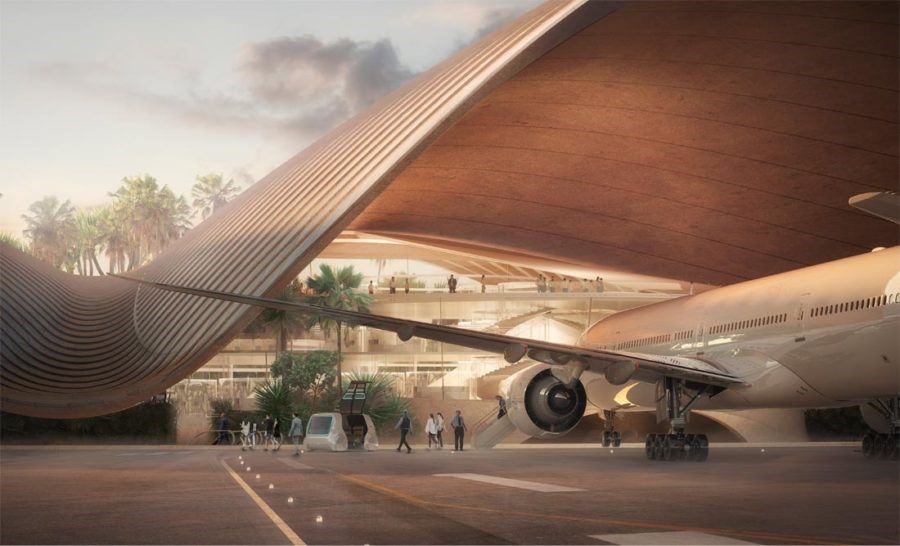Red Sea airport is a new international carbon-neutral airport being built in Saudi Arabia. The airport is being constructed by The Red Sea Development Company (TRSDC) and designed by Foster and Partners.
The Red Sea Airport is located on an open plain between the coastal dunes and the mountains. that will include an archipelago of 90 natural islands, volcanoes, desert landscapes and mountains. It will feature luxury hotels, residential units, commercial, retail and recreational areas. The development of the international airport will play an important role in transforming the Kingdom of Saudi Arabia.
The airside infrastructure works to be performed by the JV will include the construction of the runways, parallel and link taxiways, as well as pavement works. The contractual scope also includes aeronautical navigational aids, airside utilities, aerodrome ground lighting, helipads, roads, and buildings.
TRSDC group chief executive John Pagano said the airport would be ready to welcome guests early next year.“Red Sea International is ushering in a carbon-neutral, net-zero era for airport designs and operations,” he said.
“As the region’s first-ever airport powered by 100 per cent renewable energy, RSI will serve as an innovative blueprint for decarbonised urban destinations of the future,” John Pagano further explained.
The airport and the greater tourism destination will entirely rely on renewable energy for their power needs. Shaded areas and natural ventilation will reduce the use of air conditioners. The airport will offer next-generation smart experience through advanced design features and the use of the latest technology.
Design of the Carbon-neutral Red Sea Airport
The airport architecture is inspired by the surrounding desert landscape and represents the Red Sea project’s vision. The design will enable a calm and luxurious experience throughout the terminal.
The design of the terminal aims to bring the experience of a private aircraft terminal to every traveller by providing smaller, intimate spaces that feel luxurious and personalised. The form of the roof shells cantilevers on the landside and airside to provide shade to the passengers.
The arrival experience is about the speed of processing passengers, while welcoming them to their destination along with giving them a first impression of the Red Sea Experience. Upon arrival, passengers follow the natural spatial flow down through the lush oasis landscape towards the Welcome Centre, where they are met and welcomed to the Red Sea Resort. All security and immigration checks are dealt with speedily and the checked-in baggage is sent to the resorts directly.



The Red Sea Airport design
Some unique features of the Carbon-neutral Red Sea Airport
1. The airport will extend over 28km², an area equivalent to approximately 3,920 football pitches, and feature three helipads and parallel taxiways.
2. An uniquely regenerative airport, designed by international architecture firm Foster + Partners to provide an unforgettable aviation experience.
3. The project is on track to welcome its first passengers in 2023, with capabilities to serve an estimated one million domestic and international tourists per year by 2030 – at a peak of 900 travellers per hour.
4. The airport was successfully registered with the International Air Transport Association (IATA), and recently completed test landings and take-offs on the 3.7km main runway.
5. The team hit eight million safe man-hours with 2,400 workers.
6. It will be the first and only airport in the region with a dedicated runway for seaplanes and water aerodromes, regulated by a new set of GACA safety guidelines.
7. The destination will service hydrogen-powered seaplane variants, supplied by hydrogen-electric aviation firm ZeroAvia, as well as electric vertical takeoff and landing (eVTOL) and electric short takeoff and landing (eSTOL) aircraft technology.
8.It will be fully powered by 100% renewable energy. The cost of operations and general maintenance is expected to be 1 billion Saudi riyals ($266.3m).
9. It will also be able to service hydrogen-powered seaplanes.
Red Sea International will be the first and only airport in the region with water aerodromes, areas of open water that can be used by seaplanes to land and take off.
Mr. Pagano says that this project is their step towards materialising a sustainable, regenerative gateway that will open this under-explored region” of Saudi Arabia to the world.
TRSDC intends to achieve the highest standard, Level 4+, which will help Red Sea International to become the first new airport to do so before operations begin.
The airport will be operational by the end of 2023.





